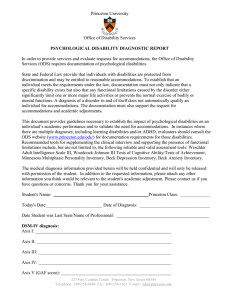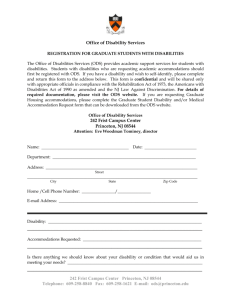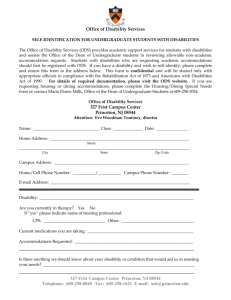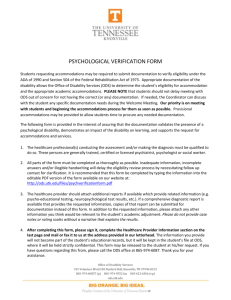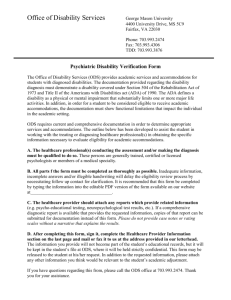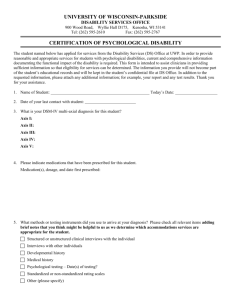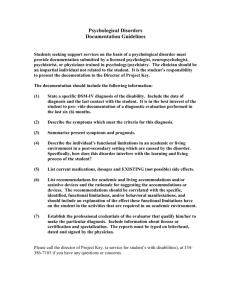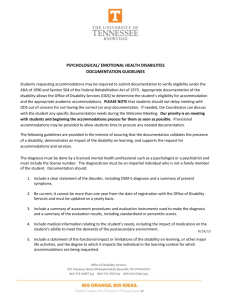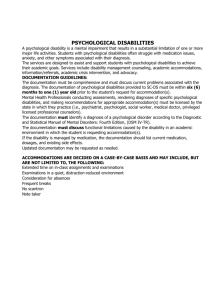Psychological Disabilities Diagnostic Report
advertisement
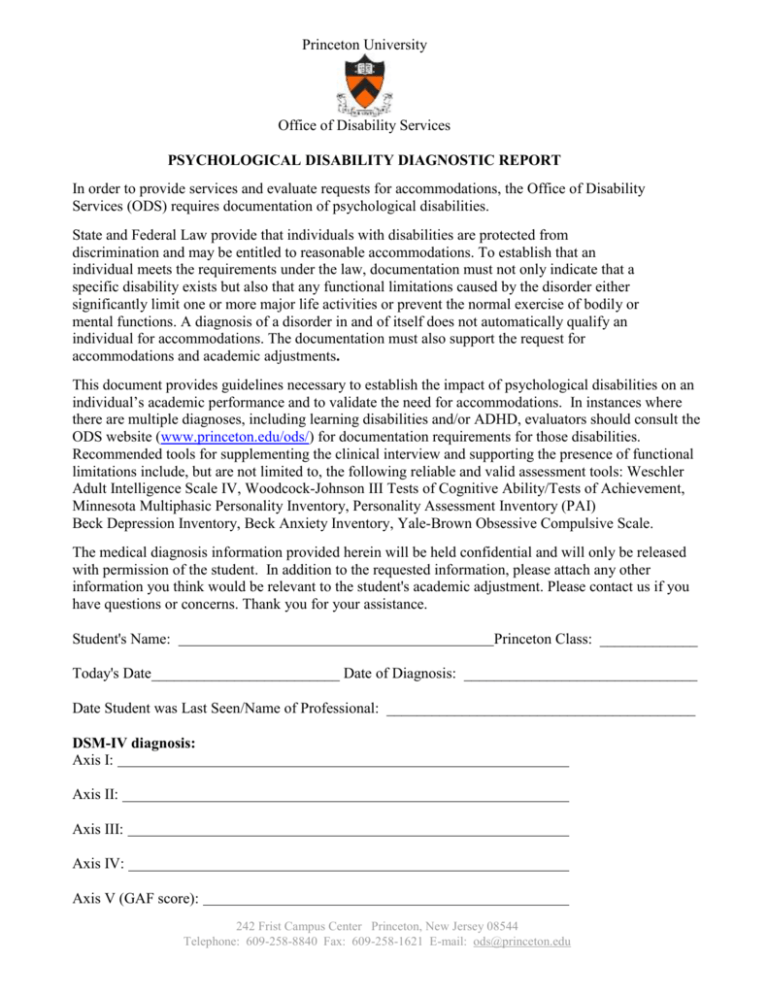
Princeton University Office of Disability Services PSYCHOLOGICAL DISABILITY DIAGNOSTIC REPORT In order to provide services and evaluate requests for accommodations, the Office of Disability Services (ODS) requires documentation of psychological disabilities. State and Federal Law provide that individuals with disabilities are protected from discrimination and may be entitled to reasonable accommodations. To establish that an individual meets the requirements under the law, documentation must not only indicate that a specific disability exists but also that any functional limitations caused by the disorder either significantly limit one or more major life activities or prevent the normal exercise of bodily or mental functions. A diagnosis of a disorder in and of itself does not automatically qualify an individual for accommodations. The documentation must also support the request for accommodations and academic adjustments. This document provides guidelines necessary to establish the impact of psychological disabilities on an individual’s academic performance and to validate the need for accommodations. In instances where there are multiple diagnoses, including learning disabilities and/or ADHD, evaluators should consult the ODS website (www.princeton.edu/ods/) for documentation requirements for those disabilities. Recommended tools for supplementing the clinical interview and supporting the presence of functional limitations include, but are not limited to, the following reliable and valid assessment tools: Weschler Adult Intelligence Scale IV, Woodcock-Johnson III Tests of Cognitive Ability/Tests of Achievement, Minnesota Multiphasic Personality Inventory, Personality Assessment Inventory (PAI) Beck Depression Inventory, Beck Anxiety Inventory, Yale-Brown Obsessive Compulsive Scale. The medical diagnosis information provided herein will be held confidential and will only be released with permission of the student. In addition to the requested information, please attach any other information you think would be relevant to the student's academic adjustment. Please contact us if you have questions or concerns. Thank you for your assistance. Student's Name: Princeton Class: _____________ Today's Date_________________________ Date of Diagnosis: _______________________________ Date Student was Last Seen/Name of Professional: _________________________________________ DSM-IV diagnosis: Axis I: Axis II: Axis III: Axis IV: Axis V (GAF score): 242 Frist Campus Center Princeton, New Jersey 08544 Telephone: 609-258-8840 Fax: 609-258-1621 E-mail: ods@princeton.edu Please provide responses to the following questions: 1. Please provide a brief summary of the diagnostic interview(s). This should include the chief complaint, educational and medical history, history of presenting symptoms and past functioning, duration and severity of the disorder, current functioning, and relevant, developmental, historical and familial data. 2. In addition to DSM-IV criteria, how did you arrive at your diagnosis? Please check all relevant items below, adding brief notes that you think might be helpful to us as we determine which accommodations and services are appropriate for the student. □ □ □ □ □ □ □ Structured or unstructured interviews with the student himself or herself Interviews with other persons. Behavioral observations. Neuro-psychological testing. List names/dates of tests administered. Attach documentation. Psycho-educational testing. List names/dates of tests administered. Attach documentation. Standardized or un-standardized rating scales. List names/dates of tests administered. Attach documentation. Other (Please specify). 3. Please check which of the activities listed below are affected by the psychological diagnosis. Indicate the level of limitation. LIFE ACTIVITY NO IMPACT MODERATE IMPACT SUBSTANTIAL IMPACT Concentrating Cognitive Processing Memory Processing speed Meeting deadlines Attending class regularly Organization & time management Stress management Reasoning Communicating Sleeping Eating Social interactions Other: Other: 242 Frist Campus Center Princeton, New Jersey 08544 Telephone: 609-258-8840 Fax: 609-258-1621 E-mail: ods@princeton.edu DON'T KNOW 4. Please describe in detail the impact and functional limitations for any life activity from question #3 that you ranked as being substantially impacted by the psychological condition. 5. What specific symptoms manifesting historically and currently might affect the student’s academic performance? Describe the impact. Please point out specific assessment data from objective testing that supports your finding of functional limitations and an impact on a major life activity. 6. What medication(s) have currently been prescribed for the student? Is he/she compliant? If so, how effective is the medication? How might side-effects, if any, affect the student's academic performance? 7. Provide relevant information regarding current treatment. 8. What is the student's prognosis? How long do you anticipate that the student's academic achievement will be impacted by his/her disability? Please give a description of the expected progression or stability of impact of the condition over time. 9. Is there anything else you think we should know about the student's psychological disability? 10. Please identify suggested accommodations with accompanying rationale. A link must be established between the suggested accommodations and the functional limitations of the individual that are pertinent to academic and residential settings. This information is essential for the University to evaluate requests for accommodations. CERTIFYING PROFESSIONAL * Name: __________________________________________________________________________ Signature: ___________________________________________ License: _______________________________ E-mail: __________________________________ Telephone: _____________________________ Fax: ____________________________________ Address: _________________________________________________________________________ * Qualified diagnosing professionals include, but are not limited to, licensed psychologists, psychiatrists, and neurologist. The diagnosing professional must have expertise in the differential diagnosis of the documented psychological disorder or condition and follow established practices in the field. 242 Frist Campus Center Princeton, New Jersey 08544 Telephone: 609-258-8840 Fax: 609-258-1621 E-mail: ods@princeton.edu
